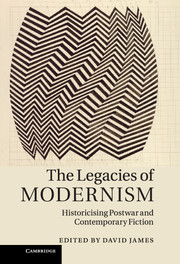Book contents
- Frontmatter
- Contents
- Notes on contributors
- Acknowledgements
- Introduction: mapping modernist continuities
- Part I Early legacies: inheriting modernism at mid century and beyond
- Chapter 1 Not what it used to be: nostalgia and the legacies of modernism
- Chapter 2 H. E. Bates, regionalism and late modernism
- Chapter 3 Moving beyond modernism in the fiction of B. S. Johnson: charting influences and comparisons
- Part II Modernist aesthetics in transition: character, perception, innovation
- Part III Reassessing the ethics of modernist fiction
- Part IV Modernism's global afterlives
- Epilogue Finding the dreadfully real
- Index
- References
Chapter 2 - H. E. Bates, regionalism and late modernism
from Part I - Early legacies: inheriting modernism at mid century and beyond
Published online by Cambridge University Press: 05 November 2011
- Frontmatter
- Contents
- Notes on contributors
- Acknowledgements
- Introduction: mapping modernist continuities
- Part I Early legacies: inheriting modernism at mid century and beyond
- Chapter 1 Not what it used to be: nostalgia and the legacies of modernism
- Chapter 2 H. E. Bates, regionalism and late modernism
- Chapter 3 Moving beyond modernism in the fiction of B. S. Johnson: charting influences and comparisons
- Part II Modernist aesthetics in transition: character, perception, innovation
- Part III Reassessing the ethics of modernist fiction
- Part IV Modernism's global afterlives
- Epilogue Finding the dreadfully real
- Index
- References
Summary
The word order of my title signifies the speculative aspect of this chapter, from which the connection between H. E. Bates and late modernism may emerge as no more than tangential. Yet there is certainly a drive to revitalise regional fiction in Bates's writing, which is the form for which he is best known as a novelist, a drive that reveals important overlaps with the sophisticated development of regional writing that is coming to be recognised as a significant adjunct to late modernist expression. This chapter is a query in the margins of that debate.
H. E. Bates presents a genuine conundrum to the literary historian. For much of the twentieth century (he died in 1974) he loomed large in the literary culture; yet he is notable by his near absence on the academic radar (which occasionally registers his shorter fiction). The absence of Bates in the history of the twentieth-century novel can partly be explained by his cultivation of popularity after the Second World War, and also by his phenomenal productivity and range: he published over a hundred titles between 1926 and his death. He turned his hand to many genres and literary modes, including novels, plays, short stories, novellas, autobiographies, children's books, nature books and books about the English countryside. He also wrote a critical work about the short story, and it is for this form that he is probably best known as a creative writer. His fiction ranged from late-colonial novels set in India and Burma, to wartime stories (which were commissioned by the Armed Forces), to the expressly populist comic novels featuring the Larkin family.
- Type
- Chapter
- Information
- The Legacies of ModernismHistoricising Postwar and Contemporary Fiction, pp. 40 - 52Publisher: Cambridge University PressPrint publication year: 2011



